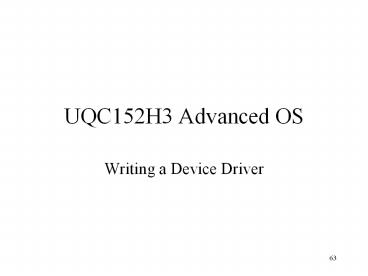UQC152H3 Advanced OS - PowerPoint PPT Presentation
Title:
UQC152H3 Advanced OS
Description:
Global & persistent, can be opened many times. Scullpipe0-3 ... check_media_change & revalidate. 75. Struct file. Very important kernel data structure ... – PowerPoint PPT presentation
Number of Views:30
Avg rating:3.0/5.0
Title: UQC152H3 Advanced OS
1
UQC152H3 Advanced OS
- Writing a Device Driver
2
The SCULL Device Driver
- Simple Character Utility for Loading Localities
- 6 devices types
- Scull-03
- Scullpipe0-3
- Scullsingle
- Scullpriv
- Sculluid
- Scullwuid
3
Types of SCULL
- Scull0-3
- Global persistent, can be opened many times
- Scullpipe0-3
- Works like a normal pipe example of blocking
- Scullsingle, scullpriv, sculluid, scullwuid
- Access versions of scull
4
Major and Minor numbers
- Major number used for device identification
- Minor used by device
- Use ltlinux/fs.hgt
- Register_chdev(unsigned int major, const char
name, struct file_ops fops) - Registers major number in static array of devices
128 entries!
5
Mknod creating a file access point
- Once we have a device table entry we need some
way for programs and utilities to access it. - Use mknod to create file access point
- mknod /dev/scull c 127 0
Device name
Device type
Minor number
Major number
6
Dynamic Allocation of Major Numbers
- It is better to use dynamic allocation of major
numbers - Use register_chrdev with intial arg0
- There is a limited number of driver numbers
- Many are already taken
- Requires script to run mknod
7
Dynamically creating a file node
8
Dynamically creating a file node
9
Deregistering devices
- Unloaded drivers should be de-registered using
- Unregister_chrdev(unsigned int major, const char
name) - Can cause procs problems if not de-registered
10
dev_t and k_dev
- System passes the major number to called code
through the major number - Passed as i_rdev in struct inode
- i_rdev is 16 bits
- Only allows 256 minor numbers
- Cant be changed!
11
kdev_t
- Linux kernels greater then 1.2 has introduced
kdev_t - It allows larger minor numbers
- It has a number of macros
- MAJOR, get a major dev_t from kdev_t
- MINOR, get a minor dev_t from kdev_t
- MKDEV return a kdev_t from a dev_t
12
File Operations
- Pointed to from struct file
- lseek
- read , write readdir
- Select
- mmap
- ioctl
- open release
- fsync fasync
- check_media_change revalidate
13
Struct file
- Very important kernel data structure
- Not the same of FILE of library calls
- Has
- Pointer to file operations
- Flag data
- Read/write position
- Inode
- Mode
14
Which minor number?
15
Opening a device
- Open does the following
- Check for errors device not ready?
- Initialises the device if this is the first open
call - Identifies the minor numbers selects correct
file op - Allocates private data
- Increments the usage count
16
(No Transcript)
17
Close or release method
- This should
- Decrement the usage count
- Deallocate anything allocated by open
- Last one out turn off the lights!
void scull_release (struct inode inode, struct
file filp) MOD_DEC_USE_COUNT































